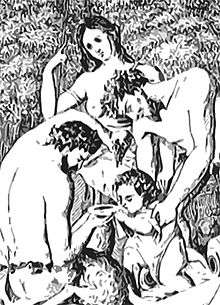Panacea
| Panacea | |
|---|---|
| Goddess of Universal health | |
 Panacea (center) administering medicine to a baby (Picture of the Veronese physician J. Gazola as part of a larger woodcut, 1716) | |
| Abode | Mount Olympus |
| Parents | Asclepius and Epione |
| Siblings | Aceso, Aglaea, Aratus, Hygieia, Iaso, Machaon, Podalirius, Telesphoros |
In Greek mythology, Panacea (Greek Πανάκεια, Panakeia) was a goddess of universal remedy. She was the daughter of Asclepius and Epione. Panacea and her four sisters each performed a facet of Apollo's art: Panacea (the goddess of universal health), Hygieia ("Hygiene" the goddess/personification of health, cleanliness, and sanitation), Iaso (the goddess of recuperation from illness), Aceso (the goddess of the healing process), and Aglæa/Ægle (the goddess of beauty, splendor, glory, magnificence, and adornment).
Panacea also had four brothers—Podaleirus, one of the two kings of Tricca, who was skilled in diagnostics, and Machaon, the other king of Tricca, who was a master surgeon (these two took part in the Trojan War until Machaon was killed by Penthesilea, queen of the Amazons); Telesphoros, who devoted his life to serving Asclepius; and Aratus, her half-brother, who was a Greek hero and the patron/liberator of Sicyon.
Panacea was said to have a poultice or potion with which she healed the sick. This brought about the concept of the panacea in medicine, a substance meant to cure all diseases. The term is also used figuratively as something intended to completely solve a large, multi-faceted problem.
A river in Thrace/Moesia was named after the goddess, and is still known as the river Zlatna Panega (from Greek panakeia).